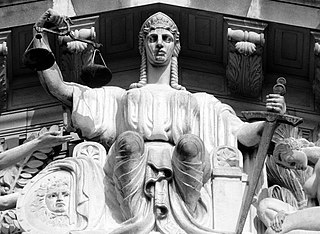
In English law, natural justice is technical terminology for the rule against bias and the right to a fair hearing. While the term natural justice is often retained as a general concept, it has largely been replaced and extended by the general "duty to act fairly".

In trust law, a constructive trust is an equitable remedy imposed by a court to benefit a party that has been wrongfully deprived of its rights due to either a person obtaining or holding a legal property right which they should not possess due to unjust enrichment or interference, or due to a breach of fiduciary duty, which is intercausative with unjust enrichment and/or property interference. It is a type of implied trust.

Salomon v A Salomon & Co Ltd[1896] UKHL 1, [1897] AC 22 is a landmark UK company law case. The effect of the House of Lords' unanimous ruling was to uphold firmly the doctrine of corporate personality, as set out in the Companies Act 1862, so that creditors of an insolvent company could not sue the company's shareholders for payment of outstanding debts.

English trust law concerns the protection of assets, usually when they are held by one party for another's benefit. Trusts were a creation of the English law of property and obligations, and share a subsequent history with countries across the Commonwealth and the United States. Trusts developed when claimants in property disputes were dissatisfied with the common law courts and petitioned the King for a just and equitable result. On the King's behalf, the Lord Chancellor developed a parallel justice system in the Court of Chancery, commonly referred as equity. Historically, trusts have mostly been used where people have left money in a will, or created family settlements, charities, or some types of business venture. After the Judicature Act 1873, England's courts of equity and common law were merged, and equitable principles took precedence. Today, trusts play an important role in financial investment, especially in unit trusts and in pension trusts. Although people are generally free to set the terms of trusts in any way they like, there is a growing body of legislation to protect beneficiaries or regulate the trust relationship, including the Trustee Act 1925, Trustee Investments Act 1961, Recognition of Trusts Act 1987, Financial Services and Markets Act 2000, Trustee Act 2000, Pensions Act 1995, Pensions Act 2004 and Charities Act 2011.

Stack v Dowden [2007] UKHL 17 is a leading English property law case from the House of Lords case concerning the division of interests in family property after the breakdown of a cohabitation relationship.

Lloyds Bank plc v Rosset[1990] UKHL 14 is an English land law, trusts law and matrimonial law case. It specifically deals with the translation into money of physical contributions from a cohabitee or spouse, under which its principles have been largely superseded.

Gissing v Gissing [1970] UKHL 3 is an English land law and trust law case dealing with constructive trusts arising in relationships between married couple. It may no longer represent good law, since the decisions of Stack v Dowden and Jones v Kernott.

Street v Mountford[1985] UKHL 4 is an English land law case from the House of Lords. It set out principles to determine whether someone who occupied a property had a tenancy, or only a licence. This mattered for the purpose of statutory tenant rights to a reasonable rent, and had a wider significance as a lease had "proprietary" status and would bind third parties.

Bias is one of the grounds of judicial review in Singapore administrative law which a person can rely upon to challenge the judgment of a court or tribunal, or a public authority's action or decision. There are three forms of bias, namely, actual, imputed and apparent bias.

Re Vandervell Trustees Ltd [1974] EWCA Civ 7 is a leading English trusts law case, concerning resulting trusts.

Hunter v Moss [1994] 1 WLR 452 is an English trusts law case from the Court of Appeal concerning the certainty of subject matter necessary to form a trust. Moss promised Hunter 50 shares in his company as part of an employment contract, but failed to provide them. Hunter brought a claim against Moss for them, arguing that Moss's promise had created a trust over those 50 shares. The constitution of trusts normally requires that trust property be segregated from non-trust property for the trust to be valid, as in Re London Wine Co (Shippers) Ltd. On this occasion, however, both Colin Rimer in the High Court of Justice and Dillon, Mann and Hirst LJJ in the Court of Appeal felt that, because this case dealt with intangible rather than tangible property, this rule did not have to be applied. Because all the shares were identical, it did not matter that they were not segregated, and the trust was valid. The decision was applied in Re Harvard Securities, creating a rule that segregation is not always necessary when the trust concerns intangible, identical property.

Alec Lobb (Garages) Ltd. v. Total Oil (GB) Ltd.[1984] EWCA Civ 2 is an English contract law case relating to undue influence.
Bristol & West Building Society v Henning [1985] EWCA Civ 6 is an English land law case that holds a person can consent to give up the right to an overriding interest in land, that will bind third parties, such as banks, that purchase a property. Although dealing with unregistered land, it is equally applicable in the case of registered land and now falls under the Land Registration Act 2002.

Prest v Petrodel Resources Ltd[2013] UKSC 34, [2013] 2 AC 415 is a leading UK company law decision of the UK Supreme Court concerning the nature of the doctrine of piercing the corporate veil, resulting trusts and equitable proprietary remedies in the context of English family law.

Geary v Rankine[2012] EWCA Civ 555 is an English land law case, concerning constructive trusts, and the establishment of a beneficial interest in an enterprise between a business owner and his or her lover and co-worker. It specifically concerned a case where the latter person received no formal wages and had entered no formal ownership nor partnership agreement nor directly or indirectly contributed in money to the purchase price.

CIBC Mortgages plc v Pitt[1993] UKHL 7 is a decision of the House of Lords relating to undue influence. The decision confirmed that a person did not need to suffer "manifest disadvantage" under a transaction in order to challenge it for actual undue influence.

Arnold v Britton[2013] EWCA Civ 902 is an English contract law case on implied terms.

Akers v Samba Financial Group[2017] UKSC 6, [2017] AC 424 is a judicial decision of the Supreme Court of the United Kingdom relating to the conflict of laws, trust law and insolvency law.

Sevilleja v Marex Financial Ltd[2020] UKSC 31 is a judicial decision of the Supreme Court of the United Kingdom relating to company law and the rule against reflective loss.
Byers v Saudi National Bank[2022] EWCA Civ 43 is a decision of the English Court of Appeal in the long running litigation between the liquidators of SAAD Investments Company Limited and various parties relating to the alleged defrauding of the insolvent company by one of its principals.
















